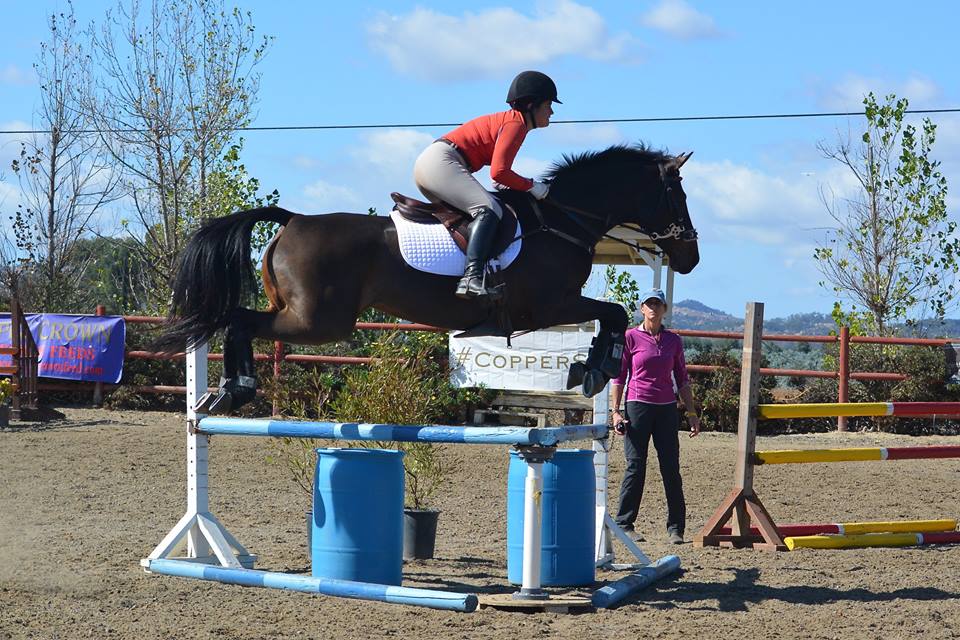William Fox-Pitt brought the heat to the West Coast this weekend in a two-part clinic presented by Scott Hayes Productions, in partnership with Dragonfire Farm and Copper Meadows Eventing. Beginning up north at Earl and Jennifer McFall’s Dragonfire Farm in Wilton, California, and ending down south at the Hoffos family’s Copper Meadows in Ramona, William imparted his wealth of knowledge to eager eventers ranging from rising amateurs and young riders to seasoned professionals.
If William was jet-lagged from his whirlwind trip from the UK, he didn’t show it, bringing the same energy and enthusiasm to each day of the clinic. Teaching groups ranging from Training up through Advanced, William placed an emphasis on the importance of mastering the fundamentals of horsemanship and how to cultivate a relationship with your horse.
My favorite quote from the clinic: “It’s not about being good; it’s about being nice to your horse.” William echoed this philosophy throughout each lesson. He wanted riders to work on establishing and maintaining “confident contact” from the beginning, encouraging the horse to accept the bit and reach for the contact.
Each day, riders were instructed to go through a normal warm-up while being careful not to ask for too much. Treating each lesson as if it were a warm-up for a competition, William advised riders to do their homework at home.
“You shouldn’t have to work on complicated things in the warm-up,” William explained. “Some people will set up angles and bounces, but if you’re working on those things in warm-up, it’s too late. The purpose of the warm-up is for the horse to be forward and into the contact and to know what’s coming next.”
William added that his horses usually jumped just a handful of fences in each warm-up phase, and only the type of fence they were about to tackle, i.e. only cross country fences for cross country warm-up, rather than show jump fences in addition. The reason for this, he explained, was because he wanted his horses to know the routine and to clearly see what was expected of them. Setting clear expectations and boundaries is helpful when you need your horse to step up to the plate and perform to the best of his ability.
William did an excellent job working through some difficulties with fresh or green horses, always quietly encouraging the riders to exercise patience. He was never impatient when a rider had an issue, rather he simply asked them to take their time and wait for their horse to settle before continuing on. The idea of encouraging horses to enjoy their jobs was prevalent throughout everything William had to say; simply put, the sport is just not as enjoyable with a horse who is sour or hates the job.
On the flip side, however, William said that it is the rider’s responsibility to ensure you hold up your end of the bargain. He used an example of Chilli Morning when he brought the stallion to compete at the Rolex Kentucky Three-Day Event a few years ago. He reminisced that the horse felt exceptionally quiet and willing on cross country that year.
“He was jumping bigger and bolder than ever, and I’m sitting up there thinking, ‘I’m about to win a nice three-day this weekend,’ and then it was over,” he recalled. “If I had woken up and paid attention, I would have noticed that he wasn’t into my rein and there wasn’t that connection that I needed.” He uses this example to remind riders that constant vigilance is necessary on even the best of days, lest you make a costly error.
At the end of the clinic, riders were left with an important reminder to always be mindful of what your horse needs in order to be successful. Establishing a good rhythm early on, maintaining straightness, and focusing on accuracy are all fundamentals of the sport, and William has built a very successful career by honing in on these basics.
There were many improvements to be seen on the second day of the clinic, and each rider left with a smile and perhaps a selfie or two!) and a few more tools to use in the future.
We’d like to thank Scott Hayes Productions, Hawley Bennett-Awad, the Hoffos family, the McFall family and the countless others who made this once-in-a-lifetime opportunity possible. A lot of preparation and planning went into an event of this magnitude, and it truly went off without a hitch. I think we’re all feeling just a little bit closer to those big goals after such an educational weekend.
And, it wouldn’t be a complete trip without trying something new!






















